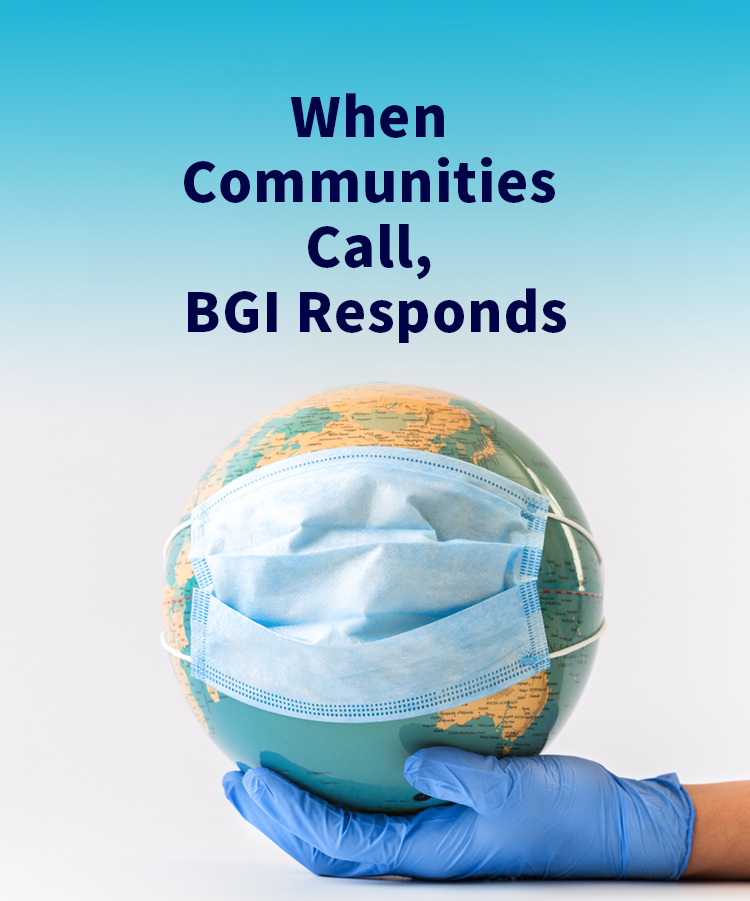“I am very honored to participate in the global fight against the epidemic on behalf of BGI, and use our technology to help the rest of the world.”
Rong OU
Production Manager of Shenzhen Sequencing Group
Since April 2020, he has been based in Serbia, Brazil, and Oman to support the local fight against COVID-19, and was responsible for laboratory technology transfer and technical guidance.
This included donations through the Mammoth Foundation, co-founded by BGI and other organizations, of nucleic acid detection kits to nearly 40 countries and organizations, and assistance to Serbia, Italy, Canada, France, Latvia, and Greece to upgrade their SARS-CoV-2 testing laboratories.
While the COVID-19 pandemic is the latest example of BGI responding to public health crises and working alongside communities across the globe, it has also been the most complex, drawing upon the research, scientific knowledge and public health experience that BGI accumulated over the previous 21 years.
Over this time, BGI's scientists and researchers have often raced to the frontline to support global communities in times of natural disasters and health crises.
The underlying RNA virus causing COVID-19 is SARS-CoV-2, a successor to SARS-CoV-1 that caused the SARS (Severe Acute Respiratory Syndrome) outbreak in 2003. BGI scientists completed the whole genome sequencing of four strains of the SARS virus rapidly in 36 hours and developed a virus detection kit in only 96 hours. BGI donated 300,000 of these kits to the National Headquarters for SARS Prevention and Control in China to help control the disease.
“I didn't think much about it. I just felt that I was needed and that I could do my part.”
Li LI
BGI Group Assistant President
In 2004, she volunteered to go to Thailand, one of the hardest hit areas following the Ocean Tsunami.
Following the outbreak of a deadly E-Coli epidemic in Germany in 2011, BGI completed the genome sequencing and published the data within five days, then developed a diagnostic kit and freely provided the scientific data and information to the international community. This helped to speed up the control of the epidemic.
“I am proud that our technology can help with the situation in the incident.”
Ruiqi XU
Senior Sales Director
In 2011, she requested a sample from Germany on the first time, and coordinate the project as a top priority.
Often, BGI teams find themselves in potentially dangerous situations. During the deadly Ebola outbreak in West Africa in 2014, a team of BGI professionals traveled to the capital of Sierra Leone to assist in sample testing, technical support and training. BGI also developed a rapid Ebola detection reagent and built an Ebola virus mutation monitoring platform, which contributed greatly to local epidemic prevention and control.
“The reason we go to these places is because we are influenced by the tradition of BGI. IN every major public health incident, BGIers will go to the frontline to support.”
Chengchao CHEN
Field Application Support Senior Manager
In 2014,he volunteered to go to Freetown, Sierra Leone, one of the worst-hit places by the Ebola pandemic, before even telling his family.
All this experience has been came to bear during the COVID-19 pandemic. The tremendous experience aggregated across so many public health crises around the world will be applied to help future public health emergencies. As BGI Group CEO, Yin Ye, explains, “We have developed a tradition of public service that can help communities combat public health emergencies; that is part of our DNA at BGI.”









